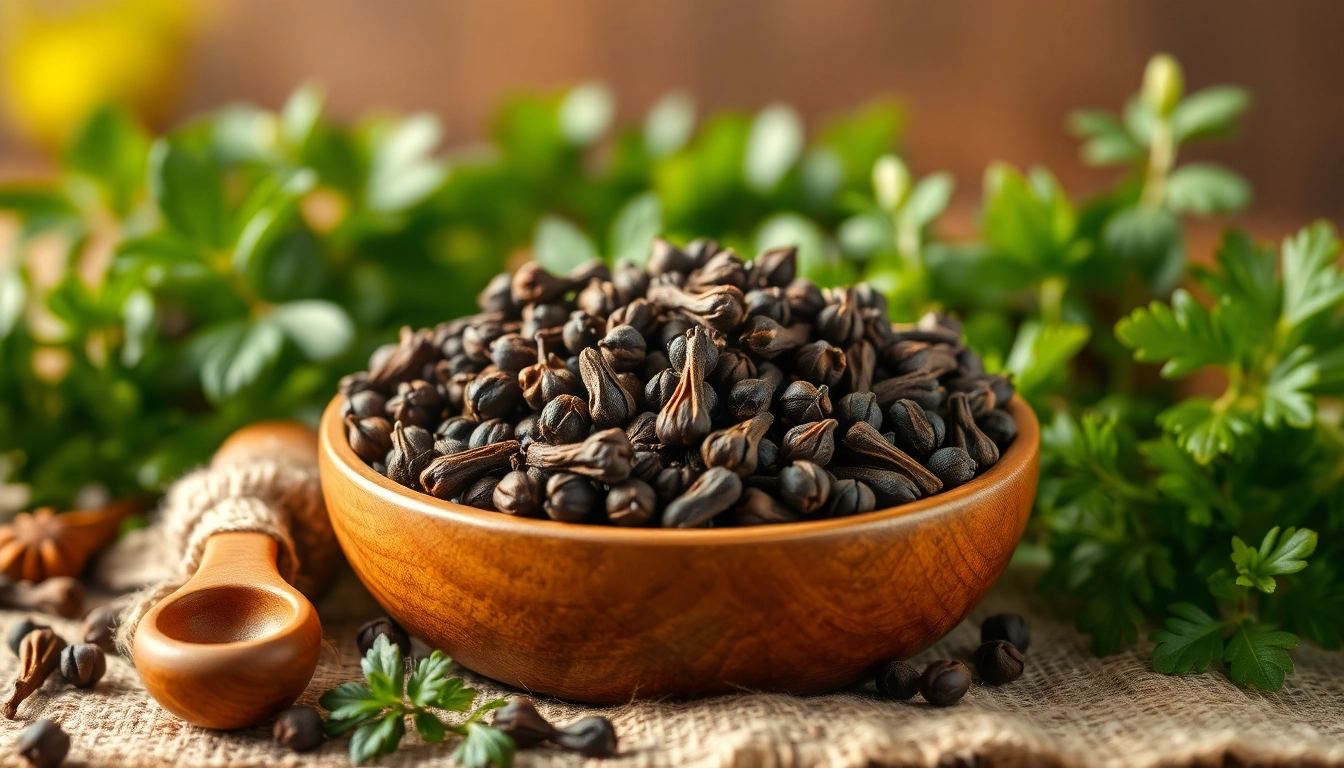The Fascinating World of Cloves
Cloves, the aromatic flower buds of the clove tree (Syzygium aromaticum), are native to the Maluku Islands in Indonesia. Known for their distinct flavor and rich history, cloves have been integral to various cultures around the globe. From culinary uses to medicinal applications, these tiny buds pack a powerful punch in both taste and health benefits. Whether you are adding them to a holiday recipe or seeking their therapeutic properties, learning more about cloves can enhance both your cooking and your wellbeing.
What are Cloves? Origin and Composition
Cloves are the immature flower buds of a tropical evergreen tree, harvested before they bloom. When dried, they turn a deep brown color with an aroma that is pungent and sweet. The flavor profile of cloves is unique; they possess a warm, aromatic quality with hints of bitterness. This complexity stems from their high content of essential oils, primarily eugenol, which accounts for about 70% of the oil and imparts a distinctive flavor and scent.
Historical Uses of Cloves in Culture
Historically, cloves have been highly valued, often referred to as ‘black gold’ and used as currency in trade. They were used by ancient civilizations, including the Romans and the Chinese, and played a significant role during the spice trade era. Cloves were believed to have protective properties against diseases and were used in traditional medicine to treat various ailments. Their importance can also be noted in cultural practices and traditions, particularly in festive seasons where their fragrant smell enhances celebrations.
The Anatomy of Cloves: A Closer Look
Understanding the anatomy of cloves provides insight into their unique properties. Each clove bud consists of four parts: the calyx (the outermost whorl of the flower), the petals (which are typically absent in harvested buds), the four stamens, and, notably, the stigma. These components contribute to the clove’s complex flavor and universal appeal as a spice. The combination of volatile and non-volatile compounds within cloves makes them an essential ingredient not just in culinary practices but also in natural remedies.
Health Benefits of Cloves
Why Cloves Are Nutrient Powerhouses
Cloves are a remarkable source of essential nutrients. They are rich in vitamins and minerals such as vitamin K, manganese, calcium, magnesium, and dietary fiber. Just a small amount of cloves can provide a significant percentage of your daily requirements for these nutrients. For instance, the manganese content supports metabolic functions and helps in building strong bones. The nutritional density of cloves makes them an exceptional addition to a balanced diet.
Antioxidant Properties: What Science Says
The antioxidant properties of cloves are well-documented, primarily due to their high eugenol content. Research indicates that eugenol can combat oxidative stress and inflammation in the body, which are linked to chronic diseases. A study published in the Journal of Medicinal Food highlights that the antioxidants in cloves can mitigate the effects of oxidative damage caused by free radicals. This means including cloves in your diet may support healthy aging and reduce the risk of various health problems.
Potential Health Benefits and Studies on Cloves
Several studies illustrate the health benefits associated with cloves. For example, consuming clove oil has been linked to improved liver function. In one study, clove oil acted as a protective agent against liver damage induced by toxins, showcasing its potential for supporting liver health. Additionally, cloves may enhance digestive health, working to alleviate issues like bloating and gastrointestinal disorders. Furthermore, their anti-inflammatory properties can contribute to pain relief and have been traditionally used to treat toothaches.
Culinary Uses of Cloves
Incorporating Cloves into Recipes
Cloves are a versatile spice, used in both sweet and savory dishes. They are featured in spice blends, marinades, and as a central ingredient in holiday favorites like mulled wine, pumpkin pie, and gingerbread cookies. For instance, to enhance the warmth of a curry or stew, adding whole cloves can elevate the dish’s flavor profile. They release their aroma as they cook, infusing the dish with a subtle spiciness that is both comforting and complex.
Cloves in Traditional Dishes Around the World
Different cultures have incorporated cloves into their cuisines, reflecting the spice’s global journey. In Indian cuisine, cloves are essential in garam masala, a key spice blend used in many dishes. Middle Eastern dishes, such as rice pilaf and braised meats, often feature cloves to add depth of flavor. In Western contexts, cloves are frequently found in holiday recipes, underscoring their association with warmth and celebration.
How to Use Cloves in Modern Cooking
Using cloves in modern cooking can be as simple as adding a few whole buds to a pot of simmering liquids or grinding them for use in dry rubs and spice mixes. Here are a few tips for incorporating cloves into your dishes:
- Infuse: Add whole cloves to soups and stews during cooking; remember to remove them before serving.
- Ground Spice: Use ground cloves in baking recipes for cookies, cakes, and spiced beverages.
- Flavor Enhancer: Blend cloves into sauces for meats, enhancing the taste without overpowering it.
Medicinal Applications of Cloves
Clove Oil: Extraction and Uses
Clove oil, extracted from the buds, leaves, and stems of the clove tree, carries the potent properties of cloves concentrated in liquid form. It is widely used in aromatherapy as it may help alleviate stress and anxiety, thanks to its calming scent. Additionally, clove oil is known for its analgesic properties, making it a common natural remedy for dental pain. To use clove oil therapeutically, it can be diluted with a carrier oil and applied topically or used in a diffuser for its aromatic benefits.
Homemade Remedies Using Cloves
Cloves can be utilized in various homemade remedies, owing to their therapeutic properties. Here are a few popular methods:
- Clove Tea: Steeping a few whole cloves in boiling water creates a soothing tea that aids digestion and reduces nausea.
- Clove Oil for Toothache: Applying diluted clove oil directly to the affected area can relieve pain and inflammation.
- Clove-infused Honey: Infuse honey with cloves for a natural cough remedy, combining the soothing properties of honey with the medicinal benefits of cloves.
Precautions and Considerations When Using Cloves
While cloves offer numerous benefits, certain precautions should be taken. Clove oil should always be diluted before applying topically, as it can be potent and potentially irritating to the skin. Additionally, individuals with bleeding disorders or those undergoing surgery should consult a healthcare professional before consuming cloves in significant amounts, due to their blood-thinning properties. It is also advisable to monitor for allergic reactions, especially in those who have a history of spice allergies.
Choosing and Storing Cloves
How to Select High-Quality Cloves
When selecting cloves, look for whole buds that are firm and plump with a rich brown color. They should have a potent aroma, signaling their freshness. Avoid cloves that appear dull, broken, or have an off smell, as these may be stale or of low quality. Choosing organic cloves can also ensure that you’re consuming a product free from pesticides and chemicals.
Best Practices for Storing Cloves
Proper storage of cloves is essential to maintain their flavor and potency. Here are some effective methods:
- Keep in Air-tight Containers: Store cloves in dark, airtight containers to prevent exposure to light and moisture.
- Cool, Dry Place: Maintain a cool, dry environment; a pantry or a cabinet away from direct sunlight works best.
- Use Whole Cloves: Whenever possible, use whole cloves instead of ground, as they retain their flavor longer and are more potent.
Innovative Ways to Use Cloves Beyond Cooking
Beyond culinary applications, cloves can serve various purposes around the home. For instance, they can be used in home fragrance products, like potpourri or homemade candles, as they release a warm, inviting scent. In addition, cloves can act as a natural repellent for some pests; placing whole cloves around your kitchen or pantry can deter insects. Their antiseptic properties also make them a great choice for natural cleaning solutions.



